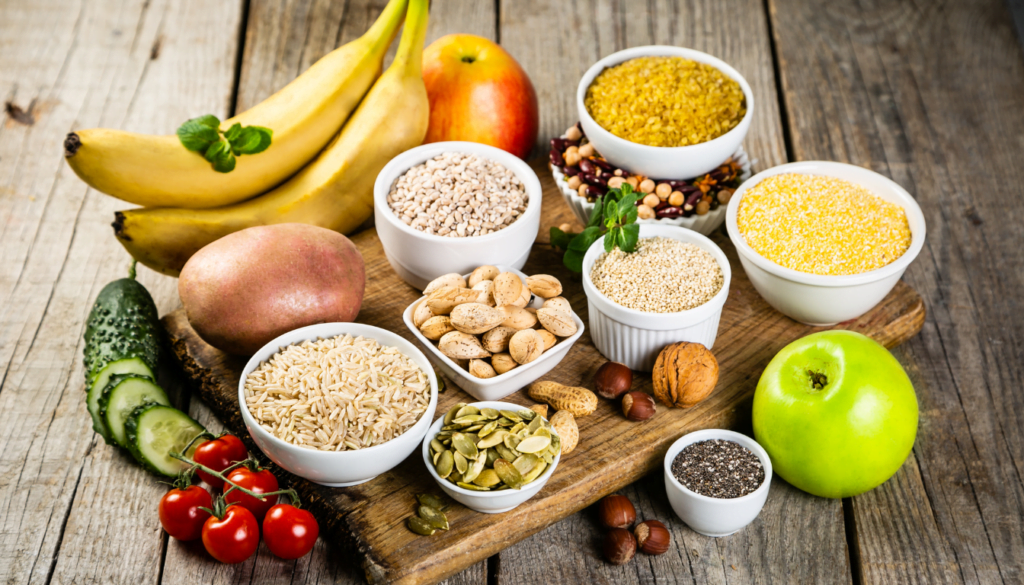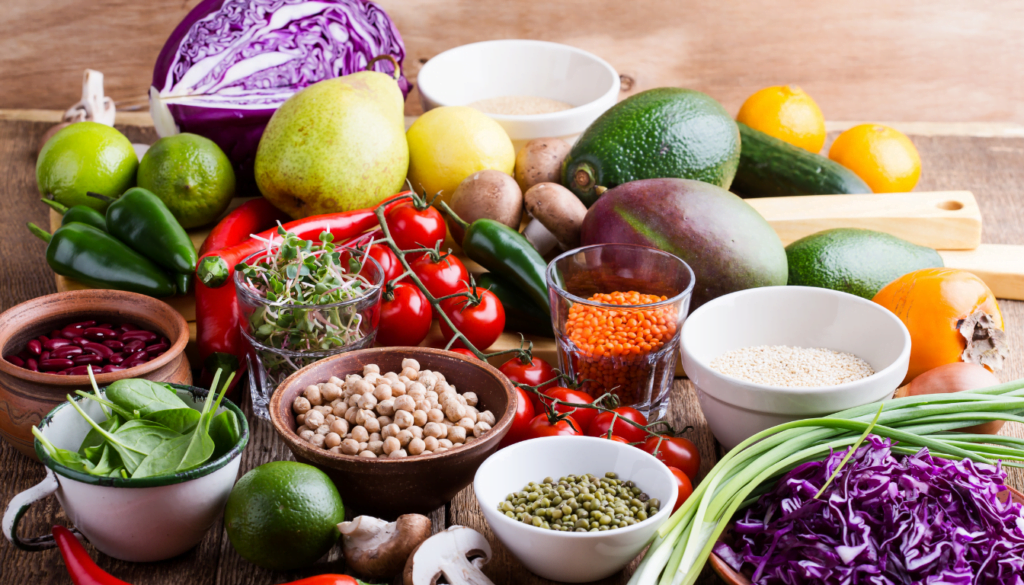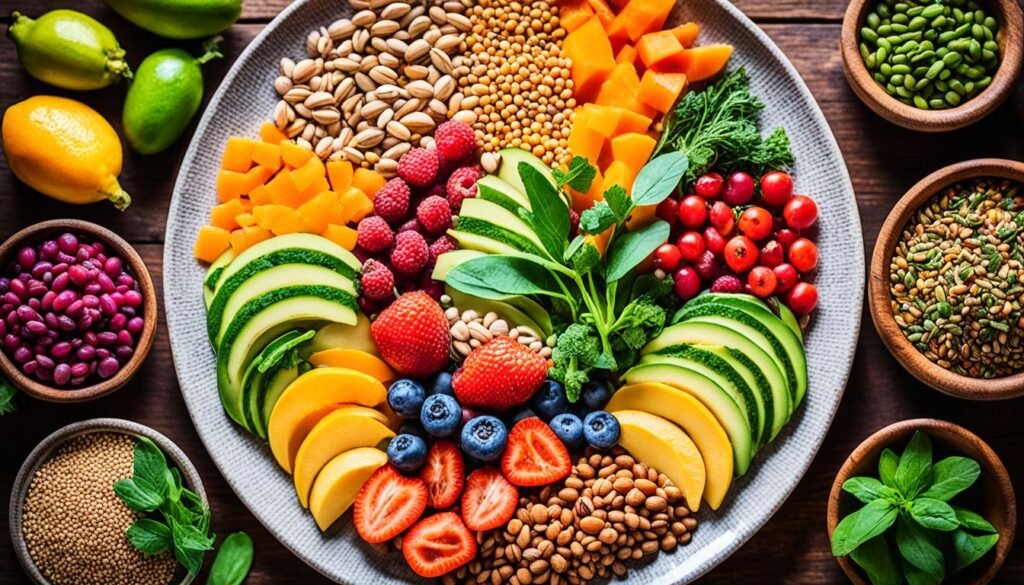I am excited to share with you the benefits of incorporating Ayurvedic principles into a vegan diet, promoting overall health and balance. Ayurveda, an ancient Indian system of medicine, emphasizes individualized nutrition based on each person’s unique needs. By following Ayurvedic guidelines, vegans can find balance by choosing the right foods for their constitution.
Talya Lutzker, author of The Ayurvedic Vegan Kitchen, has provided a wealth of recipes and tips to help vegans create a balanced and nourishing plant-based meal plan. Ayurveda suggests that most digestive issues are caused by diet and lifestyle choices, so embracing this holistic approach can lead to better digestion and overall wellness.
To exemplify this, let’s delve into the key principles of Ayurveda for a vegan diet, the benefits it offers, and how you can incorporate Ayurvedic recipes and healing remedies into your plant-based lifestyle.
Table of Contents

Key Takeaways:
- Ayurvedic principles can guide vegans in choosing the right plant-based foods for their constitution.
- Ayurveda recognizes the individual’s unique dosha type and provides specific recommendations for each.
- An Ayurvedic vegan diet can support overall health, reduce the risk of chronic diseases, and promote weight loss.
- The Ayurvedic Vegan Kitchen offers a wide range of vegan recipes based on Ayurvedic principles.
- Ayurvedic healing remedies and mindful eating practices can enhance the benefits of an Ayurvedic vegan diet.
Understanding Ayurvedic Principles for a Vegan Diet
When following a vegan diet, incorporating Ayurvedic principles can enhance your overall well-being and balance. Ayurveda, an ancient Indian system of medicine, recognizes that each person has a unique constitution composed of three doshas: vata, pitta, and kapha. By understanding your dominant dosha, you can make dietary choices that align with your individual needs and promote optimal health.
Ayurvedic cookbooks provide invaluable guidance on eating right for your dosha type, offering specific recipes coded for each dosha. Whether you are a vata, pitta, or kapha type, these cookbooks allow you to create a vegan meal plan with ingredients that support your constitution. For example, certain doshas may benefit from a vegan diet rich in cooling foods like leafy greens and fresh fruits, while others may require warming foods and spices.
Incorporating whole, unprocessed foods is a fundamental principle of Ayurveda. These foods provide nourishment and balance to the body, supporting digestion and overall health. By observing how different foods affect your body and mind, you can make mindful choices that align with Ayurvedic principles of holistic nutrition.
Ayurveda and Veganism
Ayurveda encourages a vegan diet for certain doshas, such as kapha and pitta. Veganism, when aligned with Ayurvedic principles, provides a natural way to balance these doshas and promote well-being. For vata types, who may require more grounding and nourishing foods, alternative sources of fat and protein may need to be incorporated.
By embracing a vegan diet, individuals can tap into the healing power of plant-based foods and experience the numerous benefits associated with a plant-based lifestyle. Vegan meal plans based on Ayurvedic principles provide ample opportunities to indulge in nutrient-rich, hearty meals.
“The Ayurvedic vegan diet offers a harmonious combination of plant-based nutrition and ancient healing wisdom.”

Embracing Ayurvedic principles alongside a vegan lifestyle sets the stage for vibrant health, balance, and vitality.
| Benefits | Key Principles |
|---|---|
| Supports overall well-being | Incorporating whole, unprocessed foods |
| Promotes balance of doshas | Observing how different foods affect your body |
| Enhances digestion | Aligning with your dosha type |
| Improves vitality and energy | Eating right for your unique constitution |
Benefits of an Ayurvedic Vegan Diet
Following an Ayurvedic vegan diet offers numerous benefits. Plant-based diets have been shown to reduce the risk of chronic diseases, promote weight loss, and improve overall health. Ayurveda emphasizes the importance of mindfulness while eating, encouraging individuals to pay attention to how different foods make them feel. Vegan recipes based on Ayurvedic principles can provide a rich variety of flavours and nutrients, making it easier to enjoy a balanced and satisfying plant-based diet.
One of the key benefits of an Ayurvedic vegan diet is its positive impact on health. Studies have shown that plant-based diets can lower the risk of heart disease, high blood pressure, and type 2 diabetes. By eliminating animal products and focusing on whole, unprocessed foods, individuals can improve their cholesterol levels, blood sugar control, and overall cardiovascular health. Additionally, the abundance of fruits, vegetables, whole grains, and legumes in a vegan diet provides essential vitamins, minerals, and antioxidants that support immune function and protect against certain types of cancer.
Mindful eating is another essential component of an Ayurvedic vegan diet. By practicing mindful eating, individuals can develop a deeper connection with their food and become more aware of their body’s cues of hunger and fullness. This helps prevent overeating and promotes a healthier relationship with food. Mindful eating also encourages individuals to slow down, savour each bite, and fully appreciate the flavours and textures of their meals.
Moreover, vegan recipes based on Ayurvedic principles offer a wide range of options that cater to different taste preferences and dietary needs. From delicious plant-based curries to hearty veggie bowls and nourishing soups, the possibilities are endless. By incorporating a variety of herbs, spices, and cooking techniques, Ayurvedic vegan recipes provide a diverse array of flavours and nutrients, ensuring a satisfying and well-rounded plant-based diet.
In summary, adopting an Ayurvedic vegan diet can have numerous benefits for overall health and well-being. The combination of plant-based diet benefits, vegetarian recipes, and mindful eating habits creates a holistic approach to nutrition that supports optimal health. By embracing the principles of Ayurveda and incorporating them into a vegan lifestyle, individuals can experience the transformative power of a balanced and nourishing plant-based diet.
Discovering Ayurvedic Vegan Recipes
Incorporating Ayurvedic principles into your vegan lifestyle is made easy with The Ayurvedic Vegan Kitchen by Talya Lutzker. This comprehensive cookbook offers a diverse range of vegan recipes that adhere to Ayurvedic guidelines, ensuring not only delicious meals but also a balanced and nourishing plant-based meal plan.
One of the unique features of The Ayurvedic Vegan Kitchen is its consideration of different dosha types. Ayurveda recognizes that each individual has a specific dosha constitution – vata, pitta, or kapha – and dietary choices should be tailored to support one’s dosha type. With a variety of recipes categorized for each dosha, individuals can customize their meal plans based on their specific needs.
Ayurvedic Dosha Types and Recommended Daily Routines
| Dosha Type | Recommended Foods | Recommended Daily Routines |
|---|---|---|
| Vata | Warm, grounding foods | Meditation, gentle exercise, warm oil massages |
| Pitta | Cooling, hydrating foods | Yoga, meditation, time in nature |
| Kapha | Spicy, light foods | Regular exercise, dry brushing, vigorous activities |
The Ayurvedic Vegan Kitchen showcases recipes from various cuisines, including American and Indian, allowing individuals to explore a wide range of flavours while enjoying natural, plant-based ingredients. From nourishing soups and hearty main dishes to delectable desserts and energizing beverages, the cookbook has something for every palate.
Additionally, The Ayurvedic Vegan Kitchen provides valuable information on Ayurvedic doshas and recommended daily routines. Understanding your dosha type and incorporating the suggested daily practices can enhance the benefits of an Ayurvedic vegan lifestyle.

“The Ayurvedic Vegan Kitchen not only offers delicious recipes but also empowers individuals to embrace an Ayurvedic vegan lifestyle tailored to their unique constitution. With its diverse range of plant-based recipes, this cookbook is a valuable resource for anyone seeking balance, wellness, and nourishment through Ayurveda.”
By exploring The Ayurvedic Vegan Kitchen, you can embark on a culinary journey that celebrates the fusion of Ayurvedic principles with vegan cooking. Whether you are new to Ayurveda or a seasoned practitioner, this cookbook provides a wealth of inspiration for creating balanced and satisfying meals.
Incorporating Ayurvedic Healing Remedies
Ayurveda offers a holistic approach to health, focusing on natural remedies and practices that promote overall well-being. By incorporating Ayurvedic healing remedies into your daily routine, you can enhance your holistic nutrition and support your body’s natural healing processes.
One of the key aspects of Ayurvedic healing is the use of herbal teas, spices, and oils. These natural health remedies can help restore balance to your body and address specific health issues. For example, ginger tea is known for its ability to aid digestion and soothe an upset stomach. Turmeric, on the other hand, is a powerful anti-inflammatory spice that can help reduce inflammation and support joint health.
In addition to herbal remedies, Ayurvedic practices can also be incorporated into your vegan lifestyle to enhance your overall wellness. Oil pulling, a practice where you swish oil in your mouth for a few minutes, is believed to promote oral health and detoxification. Self-massage, known as abhyanga, can help improve circulation, nourish the skin, and reduce stress.
Ayurvedic Healing Remedies at a Glance
| Remedy | Benefits |
|---|---|
| Ginger Tea | Aids digestion and soothes an upset stomach |
| Turmeric | Powerful anti-inflammatory that supports joint health |
| Oil Pulling | Promotes oral health and detoxification |
| Abhyanga (Self-Massage) | Improves circulation, nourishes the skin, and reduces stress |
By incorporating Ayurvedic healing remedies into your vegan lifestyle, you can take a proactive approach to your well-being. These natural health remedies, combined with a holistic nutrition and mindful practices, can help you achieve optimal wellness and support your body’s natural healing abilities.
Mindful Eating for Ayurvedic Vegans
Mindful eating is a fundamental practice in Ayurveda that can significantly enhance the benefits of a vegan diet. By consciously applying mindfulness to your eating habits, you can develop a deeper connection with your food and gain a better understanding of how it nourishes your body.
When it comes to mindful eating, it’s important to pay attention to how different foods make you feel and observe the effects they have on your body. By doing so, you can make more informed dietary choices that support your overall well-being. In Ayurveda, the focus is not just on what you eat but also on how you eat it.
One key principle of mindful eating is to slow down and savour each bite. By taking your time to fully experience the taste, texture, and aroma of your food, you can cultivate a greater appreciation for the nourishment it provides. Eating in a calm and relaxed environment without distractions can also help you fully engage with your meal and be present in the moment.
Incorporating mindful eating habits into your plant-based lifestyle can have numerous benefits. It allows you to develop a more intuitive understanding of your body’s needs and helps you make choices that align with your unique constitution. By being mindful of the foods you consume, you can ensure that your diet is balanced, nutritionally rich, and supportive of your holistic well-being.
The Benefits of Mindful Eating for Ayurvedic Vegans
- Improved digestion: Mindful eating promotes optimal digestion by encouraging conscious chewing and slower eating. This allows for better assimilation of nutrients and helps prevent common digestive issues.
- Enhanced portion control: By paying attention to your body’s hunger and fullness cues, you can develop a healthier relationship with food and avoid overeating.
- Better food choices: Mindful eating helps you become more attuned to the impact of different foods on your body. This awareness empowers you to choose plant-based foods that align with your unique constitution and promote optimal health.
- Increased satisfaction: By savouring each bite and truly enjoying your food, you can find greater satisfaction and fulfilment in your meals.
Practicing mindful eating as an Ayurvedic vegan can deepen your connection not only with your food but also with yourself. It allows you to nourish your body holistically and promotes overall well-being.
“Mindful eating is an invitation to link your inner and outer worlds, to awaken and cultivate mindfulness at the table just as at every other time and place. It’s a way to imagine your table as a portal to the larger world, to appreciate the interconnections among your food, your body, and the greater body of life.” – Jan Chozen Bays

Finding Balance in a Vegan Lifestyle
Living a balanced vegan lifestyle goes beyond just the food you eat. It involves incorporating daily routines, self-care practices, and mindful activities into your life. Ayurveda, the ancient Indian system of medicine, emphasizes the importance of holistic nutrition and overall well-being. By creating a comprehensive approach to your plant-based lifestyle, you can optimize your health and find balance.
The Importance of Daily Routines
Establishing consistent daily routines can play a significant role in maintaining balance in your vegan lifestyle. Set aside time each day for activities that support your well-being, such as yoga or meditation. These practices help reduce stress, improve mental clarity, and promote a sense of harmony within your mind and body.
Self-Care Practices for Holistic Wellness
Self-care practices are essential for nurturing your physical, mental, and emotional health. Engage in activities that bring you joy and relaxation, whether it’s taking a long bath with essential oils, practicing mindfulness, or engaging in creative hobbies. Prioritizing self-care allows you to recharge and replenish your energy, enabling you to thrive in your vegan lifestyle.
Mindful Activities for Mind-Body Connection
Mindful activities can further deepen your mind-body connection and enhance your overall well-being. Engaging in activities such as nature walks, journaling, or deep breathing exercises can help you cultivate awareness and live in the present moment. By being fully present in your experiences, you can fully appreciate the benefits of your plant-based lifestyle.
“The secret of health for both mind and body is not to mourn for the past, not to worry about the future, or not to anticipate troubles, but to live in the present moment wisely and earnestly.” – Buddha
Ayurvedic Vegan Diet and Holistic Nutrition
A balanced vegan lifestyle also involves nourishing your body with holistic nutrition. The Ayurvedic vegan diet focuses on incorporating whole, plant-based foods that support your individual constitution and maintain balance. By following Ayurvedic principles, such as eating according to your dosha type, you can ensure that your vegan diet provides the necessary nutrients and promotes optimal health.

Incorporating Mindfulness into Your Eating Habits
Ayurveda emphasizes the practice of mindful eating, which involves savouring each bite, paying attention to the tastes and textures, and being aware of how different foods affect your body. By incorporating mindfulness into your eating habits, you can develop a deeper appreciation for the nourishment your food provides and make choices that align with your holistic well-being.
Finding Your Own Balance
Remember that finding balance in your vegan lifestyle is an individual journey. What works for one person may not work for another. Listen to your body and intuition as you navigate the Ayurvedic vegan diet and holistic practices. Be open to experimenting and adjusting your routines and habits to find what brings you the most balance and overall wellness.
The Ayurvedic Vegan Diet: A Personal Journey
Embarking on an Ayurvedic vegan diet has been a life-changing experience for me. As someone who values holistic nutrition and embraces a plant-based lifestyle, I was drawn to the principles of Ayurveda, which emphasizes individualized nutrition and overall wellness.
When I first started exploring the Ayurvedic vegan diet, I was amazed at how it offered a unique approach to nourishing my body. By understanding my dosha type and incorporating Ayurvedic guidelines into my meal planning, I discovered a newfound balance and harmony.

One of the most significant benefits I experienced was improved health and overall well-being. The Ayurvedic vegan diet has helped me address digestive issues and promote better digestion. By choosing the right foods for my constitution, I have noticed increased energy levels and a greater sense of vitality.
Moreover, following an Ayurvedic vegan diet has allowed me to explore a wide variety of delicious recipes that are both nourishing and satisfying. Talya Lutzker’s The Ayurvedic Vegan Kitchen has been my go-to resource, providing me with a diverse range of vegan recipes tailored to my dosha type.
The personal journey of embracing an Ayurvedic vegan diet has not been without its challenges. There were times when I had to navigate social situations where vegan options were limited. However, the support and inspiration I gained from other individuals who have embarked on this journey kept me motivated.
“The Ayurvedic vegan diet has transformed my health and connected me with a deeper sense of well-being. It has allowed me to truly listen to my body and nourish it in a holistic way.”
Through their personal stories and experiences, I realized that adopting an Ayurvedic vegan diet is not just about the food we eat but also about cultivating a mindful and sustainable lifestyle. This holistic approach to nutrition has expanded beyond my plate and influenced other aspects of my life, such as incorporating daily routines and self-care practices like yoga and meditation.
I encourage anyone interested in a plant-based lifestyle and holistic nutrition to explore the Ayurvedic vegan diet. It has the potential to transform your health and well-being, allowing you to embrace a balanced and nourishing approach to life.
Conclusion
The Ayurvedic vegan diet offers a holistic approach to nutrition and wellness, combining the principles of Ayurveda with a plant-based lifestyle. By incorporating Ayurvedic guidelines into your daily routine, you can find balance, optimize your health, and support your unique constitution.
Following an Ayurvedic vegan diet involves choosing the right foods based on your dosha type and incorporating a variety of plant-based recipes that nourish your body. By exploring cookbooks like “The Ayurvedic Vegan Kitchen” by Talya Lutzker, you can discover a wide range of delicious options coded for each dosha, allowing you to customize your meal plan according to your specific needs.
Mindful eating is another essential aspect of the Ayurvedic vegan diet. By paying attention to how different foods make you feel and observing their effects on your body, you can make informed dietary choices and develop a deeper connection with your food. Mindful eating involves savouring each bite, eating in a calm environment, and practicing gratitude for the nourishment your meals provide.
It’s important to remember that everyone’s journey towards an Ayurvedic vegan lifestyle is unique. Finding the right balance may take time and experimentation. Embracing this holistic approach can be a transformative and nourishing experience, promoting optimal health and well-being for both your body and mind.
FAQ
What is an Ayurvedic vegan diet?
An Ayurvedic vegan diet combines the principles of Ayurveda, an ancient Indian system of holistic medicine, with a plant-based lifestyle. It focuses on individualized nutrition to support overall health and balance.
How does Ayurveda inform the vegan meal plan?
Ayurveda recognizes that each person has a unique constitution composed of three doshas: vata, pitta, and kapha. By understanding your dominant dosha, you can make dietary choices that support your specific needs and create a balanced vegan meal plan.
What are the benefits of an Ayurvedic vegan diet?
Following an Ayurvedic vegan diet can reduce the risk of chronic diseases, aid in weight loss, and improve overall health. It also emphasizes mindful eating habits and offers a wide variety of delicious vegetarian recipes.
Where can I find Ayurvedic vegan recipes?
The Ayurvedic Vegan Kitchen by Talya Lutzker is a great resource for Ayurvedic vegan recipes. It offers a wide range of plant-based recipes that follow Ayurvedic principles and cater to different dosha types.
Are there natural health remedies in Ayurveda to support overall wellness?
Yes, Ayurveda incorporates natural health remedies such as herbal teas, spices, and oils to promote balance and address specific health issues. These remedies can be incorporated into a vegan lifestyle for holistic nutrition.
What is mindful eating and how does it relate to an Ayurvedic vegan diet?
Mindful eating is a practice of paying attention to the foods we eat, savouring each bite, and eating in a calm and relaxed environment. It is a key aspect of Ayurveda, encouraging individuals to observe how different foods affect their bodies and make more informed dietary choices.
How can I find balance in a vegan lifestyle?
Finding balance in a vegan lifestyle involves incorporating daily routines, self-care practices, and mindful activities. This can include yoga, meditation, self-reflection, and embracing a holistic approach to nutrition and wellness.
Are there personal stories about adopting the Ayurvedic vegan diet?
Yes, individuals who have embraced the Ayurvedic vegan diet can provide valuable insights into their experiences and how it has improved their health and overall well-being. These personal stories can inspire and motivate others to explore the benefits of this holistic approach.
Source Links
- https://kripalu.org/resources/five-ayurvedic-tips-vegans
- https://www.visithawthorn.com/shopnow/product/ayurveda-a-life-of-balance-the-complete-guide-to-ayurvedic-nutrition-and-body-types-with-recipes-barbarasbookstore-6051cf
- https://www.amazon.com/Vegan-Ayurvedic-Lifestyle-practical-Meditation/dp/B0C9SB5ZT2





